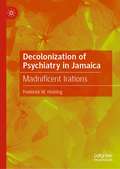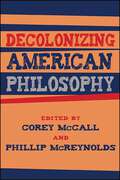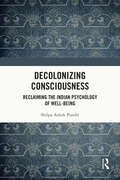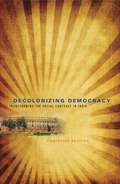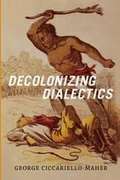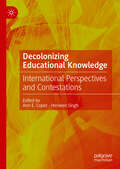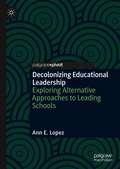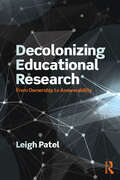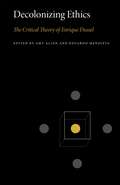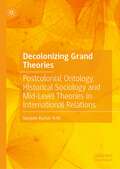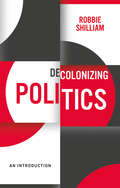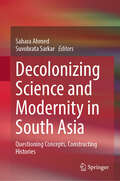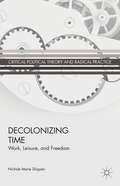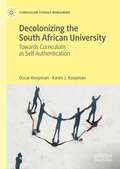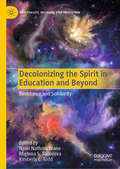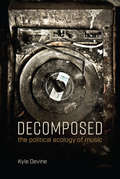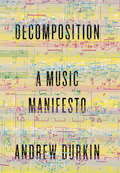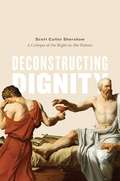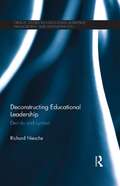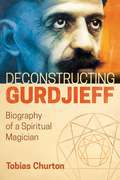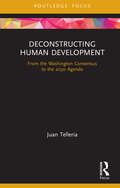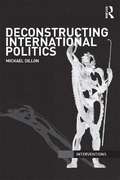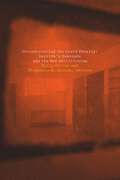- Table View
- List View
Decolonization of Psychiatry in Jamaica: Madnificent Irations
by Frederick W. HicklingThis book traces the historical postcolonial journey of four generations of Jamaican psychiatrists challenging the European colonial ‘civilizing mission’ of psychiatric care. It details the process of deinstitutionizing patients with chronic mental illness using psychohistoriographic cultural therapy, by engaging them in creating sociodrama and poetry writing, not only to express and reverse the stigma contributing to their marginalized status, but also to reconnect them to a centuries-long history of oppression. The author thereby demonstrates that psychological decolonization requires a seminal understanding of the complex mental inter-relationship between slaves and slaveowners. Further, it is shown how the model analyzes the antipodal dialectic history of descendants of Africans enslaved in the New World by brutish British Imperialists suffering from the European psychosis of white supremacy. Drawing together a detailed description of the sociopoem Madnificent Irations, with an examination of Jamaica’s political and social history, and the author’s personal experience, this compelling work marks an important contribution to decolonial literature. It will be of particular interest to students and scholars of postcolonial studies, critical race theory, the history of psychology and community psychology.
Decolonizing American Philosophy (SUNY series, Philosophy and Race)
by Corey McCall; Phillip McReynoldsIn Decolonizing American Philosophy, Corey McCall and Phillip McReynolds bring together leading scholars at the forefront of the field to ask: Can American philosophy, as the product of a colonial enterprise, be decolonized? Does American philosophy offer tools for decolonial projects? What might it mean to decolonize American philosophy and, at the same time, is it possible to consider American philosophy, broadly construed, as a part of a decolonizing project? The various perspectives included here contribute to long-simmering conversations about the scope, purpose, and future of American philosophy, while also demonstrating that it is far from a unified, homogeneous field. In drawing connections among various philosophical traditions in and of the Americas, they collectively propose that the process of decolonization is not only something that needs to be done to American philosophy but also that it is something American philosophy already does, or at least can do, as a resource for resisting colonial and racist oppression.
Decolonizing Consciousness: Reclaiming the Indian Psychology of Well-being
by Shilpa Ashok PanditThe book intertwines several strands of scholarship in Indian Philosophy, contemporary psychology and the lived Indian psychological practice inclusive of Yoga, advaita, tantra and bhakti to engage in an exploration of consciousness, cognitive science and philosophy. The book examines the characteristics of consciousness by situating it in the historical and cultural contexts of Euro-American as well as Asian, particularly Indian philosophical tradition specifically, the Bhakti tradition and creative living. The volume decolonizes the understanding of the ecology of consciousness while accounting for the diverse strands, which have given us a unique understanding of the mind, psychology, cognition and philosophy of the mind. This book will be of interest to students, teachers, and scholars of psychology, consciousness studies, cognitive science, philosophy, social psychology, Yoga studies, and Yoga psychology. It will also be useful for Yoga professionals, social workers, therapists, and anyone who is interested to learn about consciousness.
Decolonizing Democracy: Transforming the Social Contract in India
by Christine KeatingMost democratic theorists have taken Western political traditions as their primary point of reference, although the growing field of comparative political theory has shifted this focus. In Decolonizing Democracy, comparative theorist Christine Keating interprets the formation of Indian democracy as a progressive example of a “postcolonial social contract.” In doing so, she highlights the significance of reconfigurations of democracy in postcolonial polities like India and sheds new light on the social contract, a central concept within democratic theory from Locke to Rawls and beyond. Keating’s analysis builds on the literature developed by feminists like Carole Pateman and critical race theorists like Charles Mills that examines the social contract’s egalitarian potential. By analyzing the ways in which the framers of the Indian constitution sought to address injustices of gender, race, religion, and caste, as well as present-day struggles over women’s legal and political status, Keating demonstrates that democracy’s social contract continues to be challenged and reworked in innovative and potentially more just ways.
Decolonizing Democracy: Transforming the Social Contract in India
by Christine KeatingMost democratic theorists have taken Western political traditions as their primary point of reference, although the growing field of comparative political theory has shifted this focus. In Decolonizing Democracy, comparative theorist Christine Keating interprets the formation of Indian democracy as a progressive example of a “postcolonial social contract.” In doing so, she highlights the significance of reconfigurations of democracy in postcolonial polities like India and sheds new light on the social contract, a central concept within democratic theory from Locke to Rawls and beyond. Keating’s analysis builds on the literature developed by feminists like Carole Pateman and critical race theorists like Charles Mills that examines the social contract’s egalitarian potential. By analyzing the ways in which the framers of the Indian constitution sought to address injustices of gender, race, religion, and caste, as well as present-day struggles over women’s legal and political status, Keating demonstrates that democracy’s social contract continues to be challenged and reworked in innovative and potentially more just ways.
Decolonizing Dialectics
by George Ciccariello-MaherAnticolonial theorists and revolutionaries have long turned to dialectical thought as a central weapon in their fight against oppressive structures and conditions. This relationship was never easy, however, as anticolonial thinkers have resisted the historical determinism, teleology, Eurocentrism, and singular emphasis that some Marxisms place on class identity at the expense of race, nation, and popular identity. In recent decades, the conflict between dialectics and postcolonial theory has only deepened. In Decolonizing Dialectics George Ciccariello-Maher breaks this impasse by bringing the work of Georges Sorel, Frantz Fanon, and Enrique Dussel together with contemporary Venezuelan politics to formulate a dialectics suited to the struggle against the legacies of colonialism and slavery. This is a decolonized dialectics premised on constant struggle in which progress must be fought for and where the struggles of the wretched of the earth themselves provide the only guarantee of historical motion.
Decolonizing Educational Knowledge: International Perspectives and Contestations
by Ann E. Lopez Herveen SinghThis volume explores theories and practices of decolonizing education, drawing on international perspectives from scholars across the globe to engage new knowledges and build solidarities across different spaces. Decolonization is an ongoing process in which educators, community members, and practitioners alike have a stake in challenging Eurocentric paradigms and ways of knowing. The book showcases the contributions of praxis-oriented scholars and practitioners who seek to engage in decolonizing praxis that unsettles educational norms, forging new ways of thinking about teaching, learning, and leadership.
Decolonizing Educational Leadership: Exploring Alternative Approaches to Leading Schools
by Ann E. LopezThis book offers new ways of engagement for leaders seeking to connect theory to practice in decolonizing education. In the current climate where xenophobia, anti-immigrant sentiments, and other forms of exclusion make up much of the discourse, educational leaders need to seek ways to foreground other forms of knowledge and transfer them into their daily leadership practices. Lopez contributes to other critical leadership approaches while foregrounding a decolonizing approach that unsettles the coloniality manifested in education and school practices. Chapters provide school leaders with examples of ways they can challenge coloniality, white supremacy, and other forms of oppression in schooling that negatively impact some students and their educational outcomes.
Decolonizing Educational Research: From Ownership to Answerability (Series in Critical Narrative)
by Leigh PatelDecolonizing Educational Research examines the ways through which coloniality manifests in contexts of knowledge and meaning making, specifically within educational research and formal schooling. Purposefully situated beyond popular deconstructionist theory and anthropocentric perspectives, the book investigates the longstanding traditions of oppression, racism, and white supremacy that are systemically reseated and reinforced by learning and social interaction. <P><P>Through these meaningful explorations into the unfixed and often interrupted narratives of culture, history, place, and identity, a bold, timely, and hopeful vision emerges to conceive of how research in secondary and higher education institutions might break free of colonial genealogies and their widespread complicities.
Decolonizing Ethics: The Critical Theory of Enrique Dussel (Penn State Series in Critical Theory #3)
by Eduardo Mendieta Enrique Dussel Oscar Guardiola-Rivera Linda Martín Alcoff Mario Sáenz Rovner Don T. Deere Jorge Zúñiga M. Alejandro A. VallegaEnrique Dussel is Latin America’s foremost philosopher, renowned for his contributions to ethics, political philosophy, and liberation theology. Designed for classroom use, this collection of essays engages with Dussel’s encyclopedic work, making his valuable contributions accessible to English-speaking students.In addition to being one of the most original, prolific, and widely known members of the Latin American Philosophy of Liberation movement, Dussel has also made important contributions to world philosophy, the history of philosophy, the history of the Catholic Church in Latin America, and the understanding of Karl Marx. Dussel famously engaged in a decade-long debate with Karl-Otto Apel on the relationship between material and formal ethics—that is, between an ethics of the community of life and an ethics of the community of discourse—and he has produced novel interpretations and analyses of the concepts of alterity, exteriority, the other, and the world history of ethical systems. Most recently, Dussel extended his work on an ethics of liberation into a politics of liberation, developed over the course of three published volumes.In this book, scholars from around the world assess Dussel’s work in ways that are both appreciative and critical. Two essays by Dussel bookend the volume: the collection opens with a consideration of the (im)possibility of multiple modernities and ends with an autobiographical trajectory of the philosopher’s thinking.In addition to Dussel and the editors, the contributors to this volume include Linda Martín Alcoff, Don Thomas Deere, Oscar Guardiola-Rivera, Mario Sáenz Rovner, Alejandro A. Vallega, and Jorge Zúñiga M.
Decolonizing Ethics: The Critical Theory of Enrique Dussel (Penn State Series in Critical Theory)
by Eduardo Mendieta Enrique Dussel Oscar Guardiola-Rivera Linda Martín Alcoff Mario Sáenz Rovner Don T. Deere Jorge Zúñiga M. Alejandro A. VallegaEnrique Dussel is Latin America’s foremost philosopher, renowned for his contributions to ethics, political philosophy, and liberation theology. Designed for classroom use, this collection of essays engages with Dussel’s encyclopedic work, making his valuable contributions accessible to English-speaking students.In addition to being one of the most original, prolific, and widely known members of the Latin American Philosophy of Liberation movement, Dussel has also made important contributions to world philosophy, the history of philosophy, the history of the Catholic Church in Latin America, and the understanding of Karl Marx. Dussel famously engaged in a decade-long debate with Karl-Otto Apel on the relationship between material and formal ethics—that is, between an ethics of the community of life and an ethics of the community of discourse—and he has produced novel interpretations and analyses of the concepts of alterity, exteriority, the other, and the world history of ethical systems. Most recently, Dussel extended his work on an ethics of liberation into a politics of liberation, developed over the course of three published volumes.In this book, scholars from around the world assess Dussel’s work in ways that are both appreciative and critical. Two essays by Dussel bookend the volume: the collection opens with a consideration of the (im)possibility of multiple modernities and ends with an autobiographical trajectory of the philosopher’s thinking.In addition to Dussel and the editors, the contributors to this volume include Linda Martín Alcoff, Don Thomas Deere, Oscar Guardiola-Rivera, Mario Sáenz Rovner, Alejandro A. Vallega, and Jorge Zúñiga M.
Decolonizing Grand Theories: Postcolonial Ontology, Historical Sociology and Mid-Level Theories in International Relations
by Sanjeev Kumar H.M.This book examines the modes by which the grand theories of International Relations can be restructured at the level of meta-theory. It emphasizes the inability of grand theories to make sense of international relations in postcolonial societies and argues to engage in such restructuring in the domain of ontology. This is done by making a historical sociological defence toward adopting mid-level theories in IR. It is a critique of the meta-theoretical foundations of Kenneth Waltz's grand theory of neorealism, by pivoting itself upon the framework of postcolonial ontology. Dwelling upon Mohammed Ayoob’s mid-level theory of subaltern realism, it argues for undertaking the task of restructuring International Relations at the level of meta-theory, largely in the sphere of ontology. It explains how the thrust of grand theories such as neorealism, on ontological singularity can be circumvented. Owing to this, International Relations can experience a meta-theoretical transformation that may manifest in the broader engagement of the discipline itself, with the very conception of ontological multiplicity.
Decolonizing Politics: An Introduction
by Robbie ShilliamPolitical science emerged as a response to the challenges of imperial administration and the demands of colonial rule. While not all political scientists were colonial cheerleaders, their thinking was nevertheless framed by colonial assumptions that influence the study of politics to this day. This book offers students a lens through which to decolonize the main themes and issues of political science - from human nature, rights, and citizenship, to development and global justice. Not content with revealing the colonial legacies that still inform the discipline, the book also introduces students to a wide range of intellectual resources from the (post)colonial world that will help them think through the same themes and issues more expansively. Decolonizing Politics is a much-needed critical guide for students of political science. It shifts the study of political science from the centers of power to its margins, where the majority of humanity lives. Ultimately, the book argues that those who occupy the margins are not powerless. Rather, marginal positions might afford a deeper understanding of politics than can be provided by mainstream approaches.
Decolonizing Science and Modernity in South Asia: Questioning Concepts, Constructing Histories
by Suvobrata Sarkar Sahara AhmedThis book offers a unique perspective on the colonial roots of modern science, technology, and medicine (STM) in South Asia. The book questions the deconstruction of imperial visions and definitions of science and modernity in South Asia. It presents an in-depth analysis of the contested relationship between science, modernity, and colonialism. It explores how new research can contribute to the diversification of perspectives in the history and sociology of modern South Asian studies. The chapters in the book delve into various aspects of STM in South Asia. It covers diverse topics, including the social, cultural, and pedagogic context of early modern Bengal, the popularization of science in colonial Punjab, the Hindi science periodical Vigyan, and the emergence of the Indian science community. The book also examines the intersection of indigenous medical practices, ayurveda, Unani, and medical revivalism and highlights peripheral creativity in science. The contributors engage with the existing historiography to raise new questions concerning the global circulations of scientific knowledge from the perspective of South Asia and the regional appropriation of the same. It connects the history of science and modernity with South Asia's socio-economic and cultural background. It offers valuable insights into the decolonization of STM. It greatly interests scholars and students of modern South Asian history, sociology, social anthropology, and Science, Technology and Society Studies (STS).
Decolonizing Time
by Nichole Marie ShippenDecolonizing Time: Work, Leisure, and Freedom demonstrates the importance of time as a central category for political theory, providing not only a history of the fight for time through political, feminist, and critical theory, but also assessing this tradition in the context of the United States.
Decolonizing the South African University: Towards Curriculum as Self Authentication (Curriculum Studies Worldwide)
by Oscar Koopman Karen J. KoopmanThis book offers an important contribution to the field of curriculum studies and higher education by examining the impacts of colonialism and neoliberalism in the South African education system and addressing ways to decolonise curriculum and teaching. Drawing on Pinar's work in curricular theory, the authors call for integrating self-reflective curriculum development into the national curriculum process to promote indigenous education and knowledge.
Decolonizing the Spirit in Education and Beyond: Resistance and Solidarity (Spirituality, Religion, and Education)
by Njoki Nathani Wane Kimberly L. Todd Miglena S. TodorovaThis multidisciplinary collection probes ways in which emerging and established scholars perceive and theorize decolonization and resistance in their own fields of work, from education to political and social studies, to psychology, medicine, and beyond. In this time of renewed global spiritual awakening, indigenous communities are revisiting ways of knowing and evoking theories of resistance informed by communal theories of solidarity. Using an intersectional lens, chapter authors present or imagine modes of solidarity, resistance, and political action that subvert colonial and neocolonial formations. Placing emphasis on the importance of theorizing the spirit, a discourse that is deeply embedded in our unique cultures and ancestries, this book is able to capture and better understand these moments and processes of spiritual emergence/re-emergence.
Decomposed: The Political Ecology of Music (The\mit Press Ser.)
by Kyle DevineThe hidden material histories of music.Music is seen as the most immaterial of the arts, and recorded music as a progress of dematerialization—an evolution from physical discs to invisible digits. In Decomposed, Kyle Devine offers another perspective. He shows that recorded music has always been a significant exploiter of both natural and human resources, and that its reliance on these resources is more problematic today than ever before. Devine uncovers the hidden history of recorded music—what recordings are made of and what happens to them when they are disposed of. Devine's story focuses on three forms of materiality. Before 1950, 78 rpm records were made of shellac, a bug-based resin. Between 1950 and 2000, formats such as LPs, cassettes, and CDs were all made of petroleum-based plastic. Today, recordings exist as data-based audio files. Devine describes the people who harvest and process these materials, from women and children in the Global South to scientists and industrialists in the Global North. He reminds us that vinyl records are oil products, and that the so-called vinyl revival is part of petrocapitalism. The supposed immateriality of music as data is belied by the energy required to power the internet and the devices required to access music online. We tend to think of the recordings we buy as finished products. Devine offers an essential backstory. He reveals how a range of apparently peripheral people and processes are actually central to what music is, how it works, and why it matters.
Decomposition
by Andrew DurkinDecomposition is a bracing, revisionary, and provocative inquiry into music--from Beethoven to Duke Ellington, from Conlon Nancarrow to Evelyn Glennie--as a personal and cultural experience: how it is composed, how it is idiosyncratically perceived by critics and reviewers, and why we listen to it the way we do. Andrew Durkin, best known as the leader of the West Coast-based Industrial Jazz Group, is singular for his insistence on asking tough questions about the complexity of our presumptions about music and about listening, especially in the digital age. In this winning and lucid study he explodes the age-old concept of musical composition as the work of individual genius, arguing instead that in both its composition and reception music is fundamentally a collaborative enterprise that comes into being only through mediation. Drawing on a rich variety of examples--Big Jay McNeely's "Deacon's Hop," Biz Markie's "Alone Again," George Antheil's Ballet Mécanique, Frank Zappa's "While You Were Art," and Pauline Oliveros's "Tuning Meditation," to name only a few--Durkin makes clear that our appreciation of any piece of music is always informed by neuroscientific, psychological, technological, and cultural factors. How we listen to music, he maintains, might have as much power to change it as music might have to change how we listen.From the Hardcover edition.
Deconstructing Dignity: A Critique of the Right-to-Die Debate
by Scott Cutler ShershowThe right-to-die debate has gone on for centuries, playing out most recently as a spectacle of protest surrounding figures such as Terry Schiavo. In Deconstructing Dignity, Scott Cutler Shershow offers a powerful new way of thinking about it philosophically. Focusing on the concepts of human dignity and the sanctity of life, he employs Derridean deconstruction to uncover self-contradictory and damaging assumptions that underlie both sides of the debate. Shershow examines texts from Cicero’s De Officiis to Kant’s Groundwork of the Metaphysics of Morals to court decisions and religious declarations. Through them he reveals how arguments both supporting and denying the right to die undermine their own unconditional concepts of human dignity and the sanctity of life with a hidden conditional logic, one often tied to practical economic concerns and the scarcity or unequal distribution of medical resources. He goes on to examine the exceptional case of self-sacrifice, closing with a vision of a society—one whose conditions we are far from meeting—in which the debate can finally be resolved. A sophisticated analysis of a heated topic, Deconstructing Dignity is also a masterful example of deconstructionist methods at work.
Deconstructing Educational Leadership: Derrida and Lyotard (Critical Studies in Educational Leadership, Management and Administration)
by Richard NiescheJacques Derrida and Jean-François Lyotard constitute two of the most notable figures of poststructuralist thought and philosophy of the postmodern period. Both worked to reveal instabilities and uncertainty, and to destabilise assumptions and self-evident traditions for the purposes of reflection, creativity and innovative thinking. This significant volume explores the key concepts central to the work of Derrida and Lyotard in relation to educational leadership, and reveals how these ideas challenge existing structures, hierarchies and models of thought. Derrida’s notions of difference and deconstruction, and Lyotard’s concepts of language games, performativity and the differend, are specifically used to inform provocative and insightful critiques of the positivist assumptions and knowledge construction in the field of educational leadership. The book provides concrete examples of the application of theories to policy, literature and empirical data, and identifies ideas which continue to impact contemporary practices of educational leadership and management. Included in the book: - why bring Derrida and Lyotard to ELMA?- a Lyotardian politics of the standards movement in educational leadership- managing performance- witnessing deconstructions of the leader-follower binary in ELMA- limitations and critiques of Derrida and Lyotard. This important volume in the series will be of value to all those working and researching in the field of Educational Leadership, Management and Administration.
Deconstructing Gurdjieff: Biography of a Spiritual Magician
by Tobias ChurtonBeyond Meetings with Remarkable Men into the truth behind the self-crafted mythology of Gurdjieff’s life • Reveals evidence that Gurdjieff was a secret Freemason, relying on hypnotism, psychic research and spiritualism• Explores the profound influence of the Yezidis, esoteric Christianity, and the “gnostics” of Islam, the Sufis, on Gurdjieff’s Fourth Way teachings and the “Work”• Uncovers the truth behind Gurdjieff’s relations with Aleister Crowley• Accurately dates Gurdjieff’s real activities, particularly his enigmatic early lifeIn November 1949, architect Frank Lloyd Wright announced the death of “the greatest man in the world,” yet few knew who he was talking about. Enigmatic, misunderstood, declared a charlatan, and recently dubbed “the Rasputin who inspired Mary Poppins,” Gurdjieff’s life has become a legend. But who really was George Ivanovich Gurdjieff?Employing the latest research and discoveries, including previously unpublished reminiscences of the real man, Tobias Churton investigates the truth beneath the self-crafted mythology of Gurdjieff’s life recounted in Meetings with Remarkable Men. He examines his controversial birthdate, his father’s background, and his relationship with his private tutor Dean Borshch, revealing a perilous childhood in a Pontic Greek family, persecuted by Turks, forced to migrate to Georgia and Armenia, only to grow up amid more war, persecution, genocide, and revolt. Placing Gurdjieff in the true context of his times, Churton explores Gurdjieff’s roles in esoteric movements taking root in the Russian Empire and in epic imperial construction projects in the Kars Oblast, Transcaucasia, and central Asia. He reveals Gurdjieff’s sources for his transformative philosophy, his early interest in hypnosis, magic, Theosophy, and spiritualism, and the profound influence of the Yezidis and the Sufis, the “gnostics” of Islam, on Gurdjieff’s Fourth Way teachings and the “Work.” Churton also explores Gurdjieff’s ties to Freemasonry and his relationships with other spiritual teachers and philosophers of the age, such as Madame Blavatsky, Frank Lloyd Wright, and Aleister Crowley, dispelling the myth that Gurdjieff forcibly expelled the “Great Beast” from his Institute.Showing how Gurdjieff deliberately re-shaped elements of his life as parables of his system, Churton explains how he didn’t want people to follow his footsteps but to find their own, to wake up from the hypnosis that drives us blindly through life. Offering a vital understanding of the man who asked “How many of you are really alive?” the author reveals the continuing importance of Gurdjieff’s philosophy for the awakening of man.
Deconstructing Human Development: From the Washington Consensus to the 2030 Agenda (Routledge Critical Development Studies)
by Juan TelleriaThis book provides a critical deconstruction of the human development framework promoted by the United Nations Development Programme (UNDP) since 1990. Taking the Human Development Reports of the UNDP as its starting point for reflection, this book investigates the construction of this framework as well as its political function since the end of the Cold War. The book argues that the UNDP’s discourse on development relies on essentialist philosophical, cultural, and political assumptions dating back to the 19th century and concludes that these assumptions – also present in the MDGs and SDGs – impede a full grasp of the complex and multi-layered global problems of the current world. Whilst development critiques traditionally relied on liberal, Marxist or Foucauldian theoretical frameworks and focused on epistemological or political economy issues, this book draws on the post-foundational and post-structuralist work of Ernesto Laclau and Jacques Derrida and proposes an ontological and relational reading of development discourses that both complements and further develops the insights of previous critiques. This book is key reading for advanced students and researchers of Critical Development Studies, Political Science, the UN, and Sustainable Development.
Deconstructing International Politics (Interventions)
by Michael DillonMichael Dillon is internationally regarded for his contributions by political philosophers, international relations scholars and security studies experts, as well as by philosophers more broadly. It is difficult to overrate his importance to the development of critical deconstructive approaches not only in challenging traditional scholarship and addressing contemporary politics, but in articulating new approaches and new thinking. This book draws together some of his key works and is framed by an introduction written specially for the volume. It is the first full-length work to draw on the insights and techniques of deconstruction to analyse international relations. Influenced primarily by Derrida, it critiques the cornerstones of international relations such as modernity, the state, the subject, security and ethics and justice. This volume will provide an invaluable resource for teaching at undergraduate and postgraduate levels on traditional international relations courses and on the increasing number of specialised courses in critical approaches. Well designed and structured, it is accessible to the novice as well as challenging for the specialist.
Deconstructing the Death Penalty: Derrida's Seminars and the New Abolitionism
by Kelly Oliver, Stephanie M. StraubThis volume represents the first collection of essays devoted exclusively to Jacques Derrida's Death Penalty Seminars, conducted from 1999 to 2001. The volume includes essays from a range of scholars working in philosophy, law, Francophone studies, and comparative literature, including established Derridians, activist scholars, and emerging scholars. These essays attempt to elucidate and expand upon Derrida's deconstruction of the theologico-political logic of the death penalty in order to construct a new form of abolitionism, one not rooted in the problematic logics of sovereign power. These essays provide remarkable insight into Derrida’s ethical and political projects; this volume will not only explore the implications of Derrida’s thought on capital punishment and mass incarceration, but will also help to further elucidate the philosophical groundwork for his later deconstructions of sovereign power and the human/animal divide. Because Derrida is deconstructing the logic of the death penalty, rather than the death penalty itself, his seminars will prove useful to scholars and activists opposing all forms of state sanctioned killing. In compiling this volume, our goals were twofold: first, to make a case for Derrida's continuing importance in debates on capital punishment, mass incarceration, and police brutality, and second, to construct a new, versatile abolitionism, one capable of confronting all forms the death penalty might take.
